please read every pages carefully and answer correctly
i got previous answer incorrect from other expert
we are group of 20 people if you answered correctly you will get 20 upvotes
and if you answered incorrectly you will get 20 downvotes
WHEN CONDITION TO BE TREATED AS WARRANTY (SECTION 13) may condition or elect to treat the breach of the condition as a breach of warranty and not as a ground y
treating the contract as repudiated [Sub-section (1)]
Where a contract of sale is not severable and the buyer has accepted the goods or part thereof, the breaches any condition to be fulfilled by the seller can only be treated as a breach of warranty and not as a ground rejecting the goods and treating the contract as repudiated, unless there is a term of the contract, exp or implied to that effect. [Sub-section (2)]
Nothing in this section shall affect the case of any condition or warranty fulfilment of which is excused law by reason of impossibility or otherwise. [Sub-section (3)]
Analysis:
Section 13 specifies cases where a breach of condition be treated as a breach of warranty. As a result which the buyer loses his right to rescind the contract and can claim for damages only. In the following cases, a contract is not avoided even on account of a breach of a condition:
Where the buyer altogether waives the performance of the condition. A party may for his own bene waive a stipulation.
(i) Where the buyer elects to treat the breach of the conditions, as one of a warranty. That is to say, he ma
claim only damages instead of repudiating the contract.
Example: A agrees to supply B 10 bags of first quality sugar @ 625 per bag but supplies only sect quality sugar, the price of which is 600 per bag. There is a breach of condition and the buyer can rejec the goods. But if the buyer so elects, he may treat it as a breach of warranty, accept the second qui sugar and claim damages @ 25 per bag.
(Where the contract is non-severable and the buyer has accepted either the whole goods or any g thereof. Acceptance means acceptance as envisaged in Section 72 of the Indian Contract Act, 1872
(iv) Where the fulfillment of any condition or warranty is excused by law by reason of impossibility otherwise.
Waiver of conditions
Voluntary Waiver
Waives performance of contract Elect to treat condition as warranty
Compulsory Waiver
Non-severability of contract Fulfilment of conditions excused by law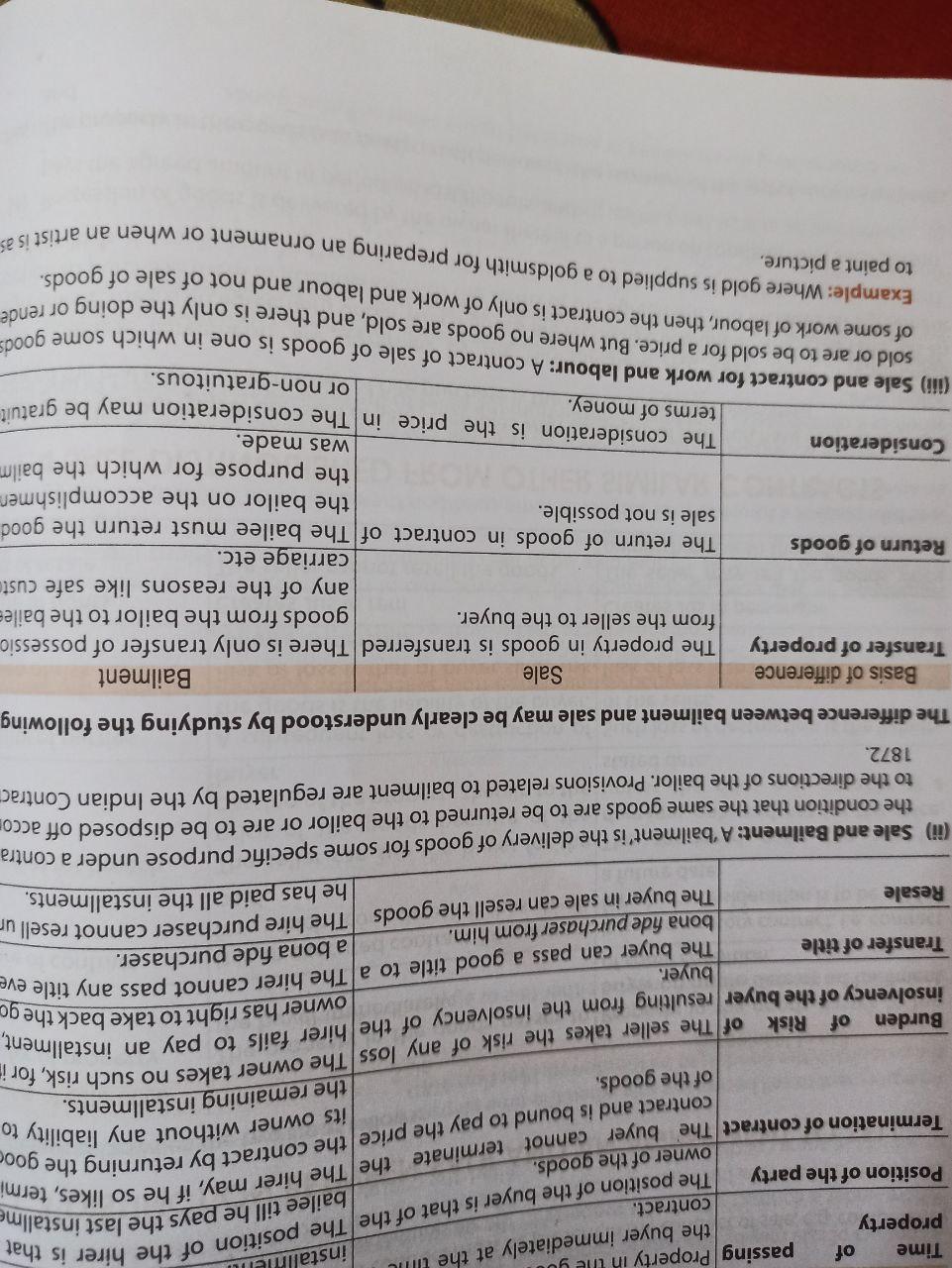
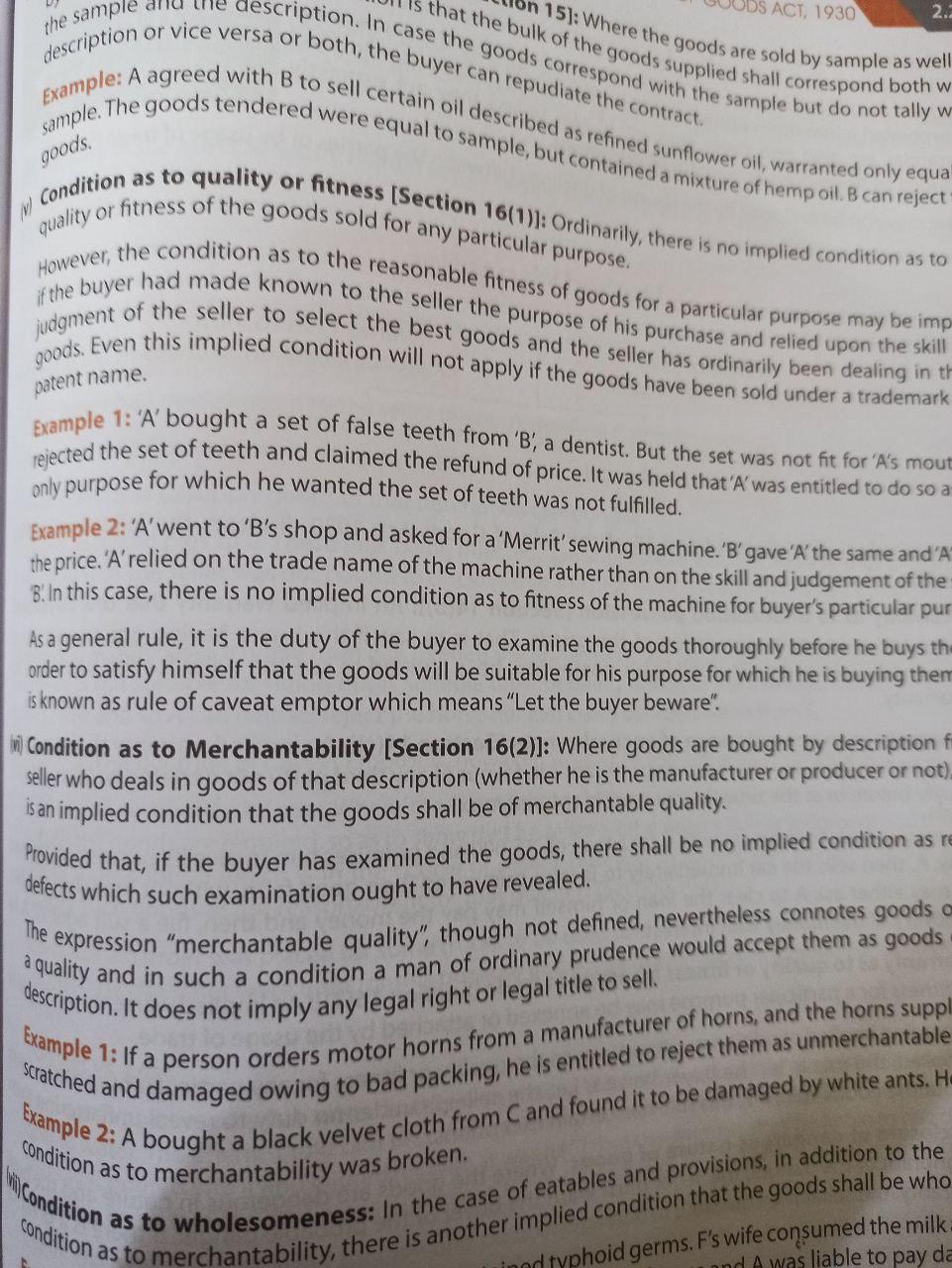
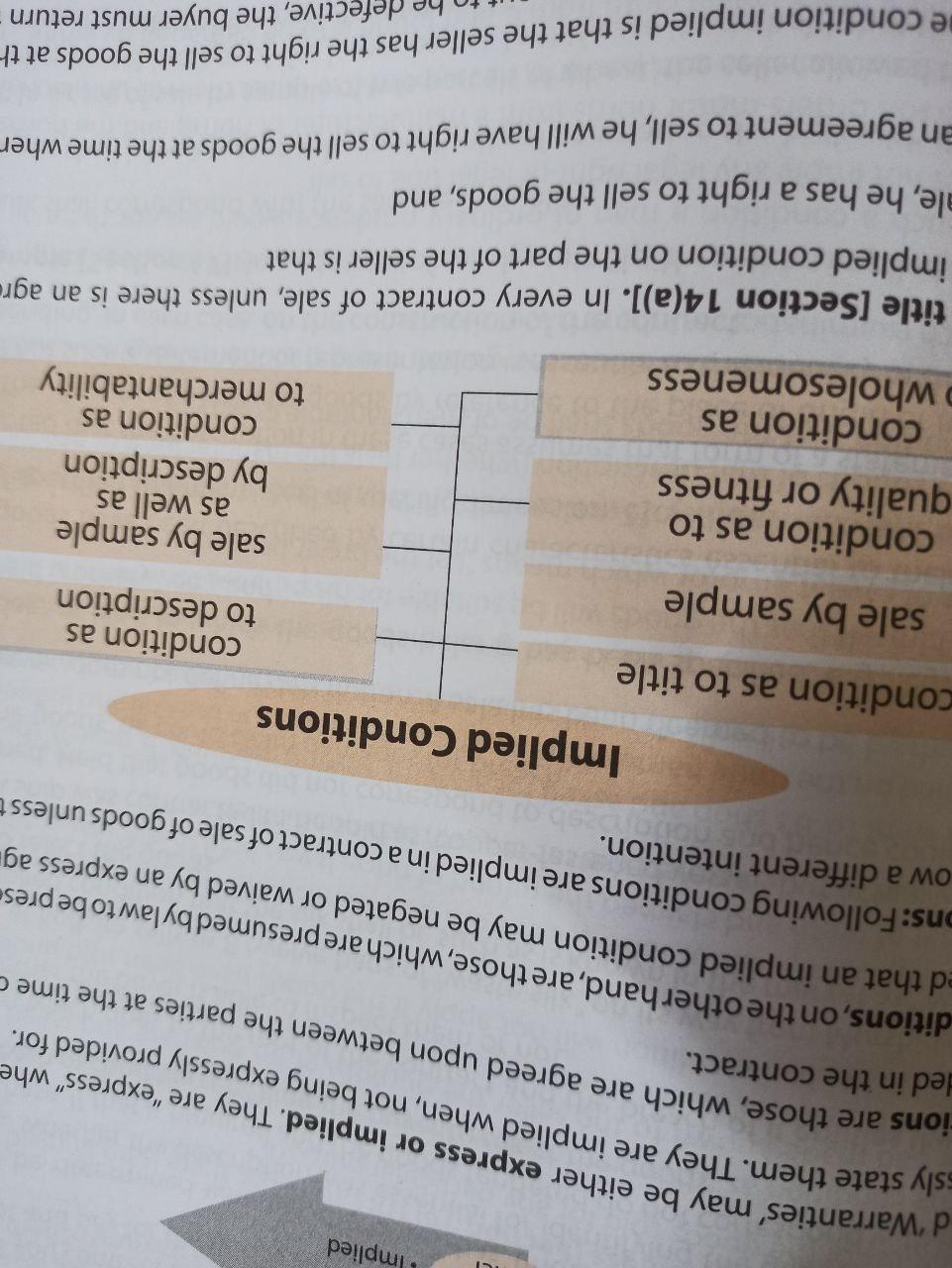
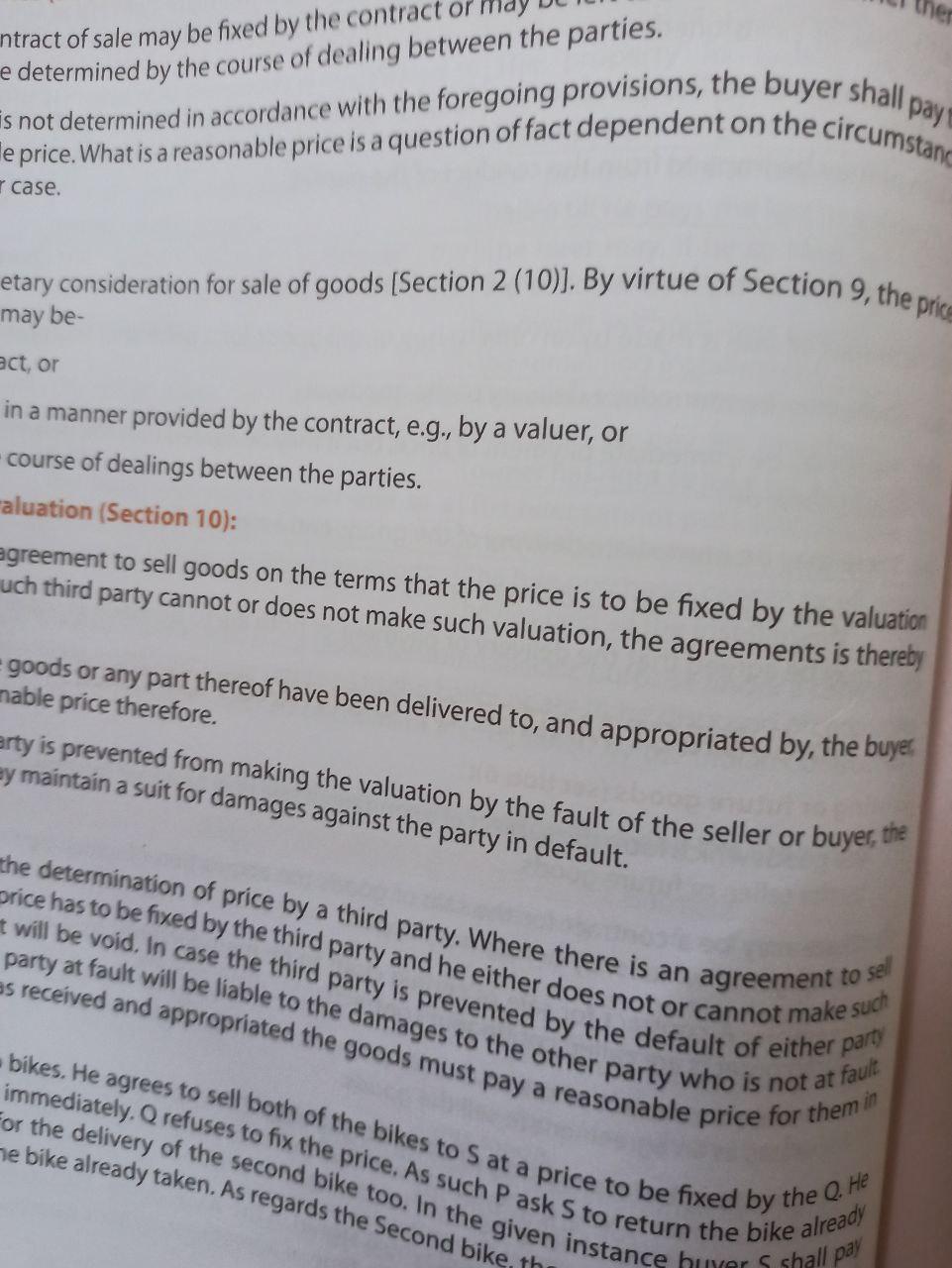
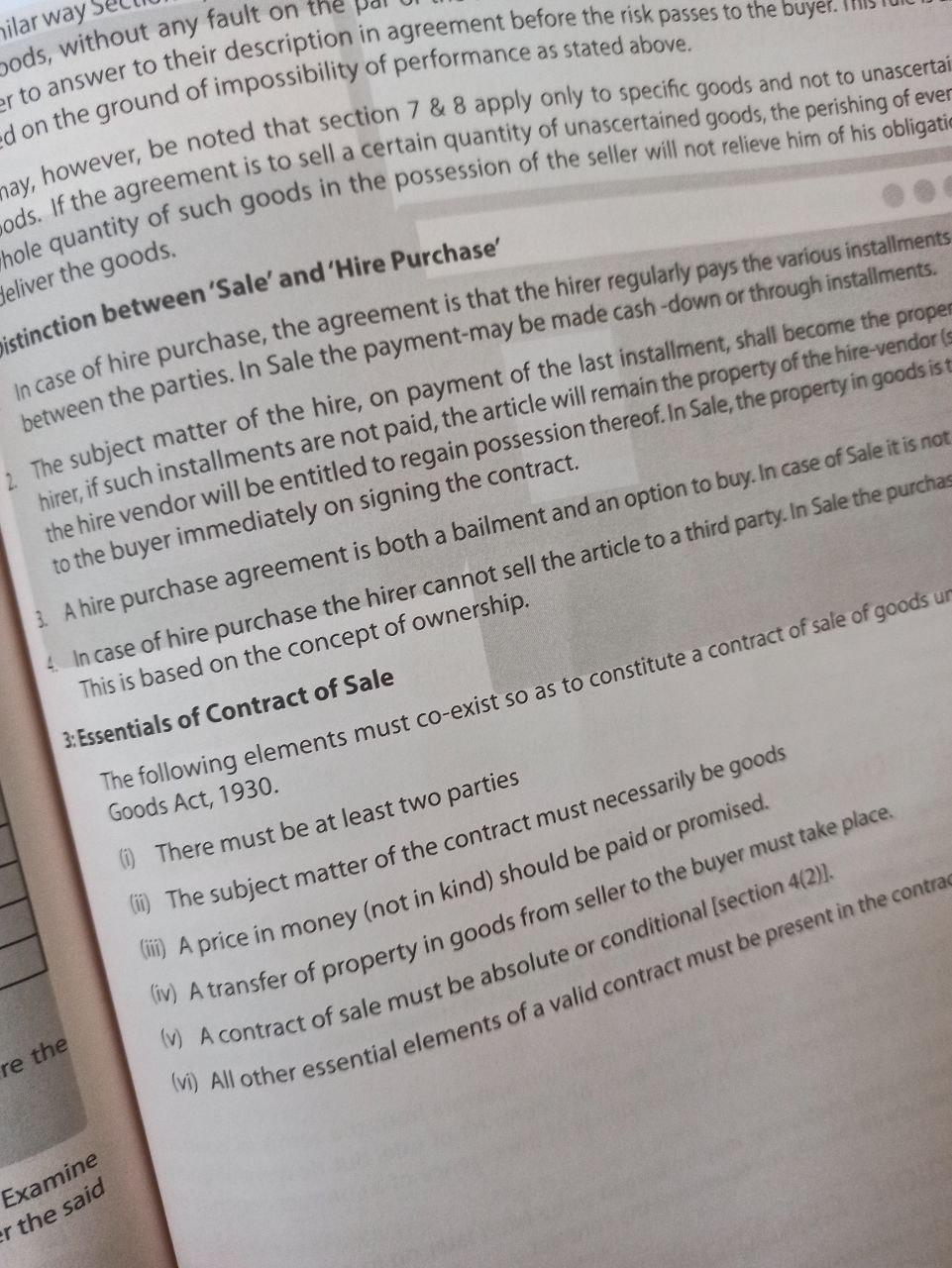

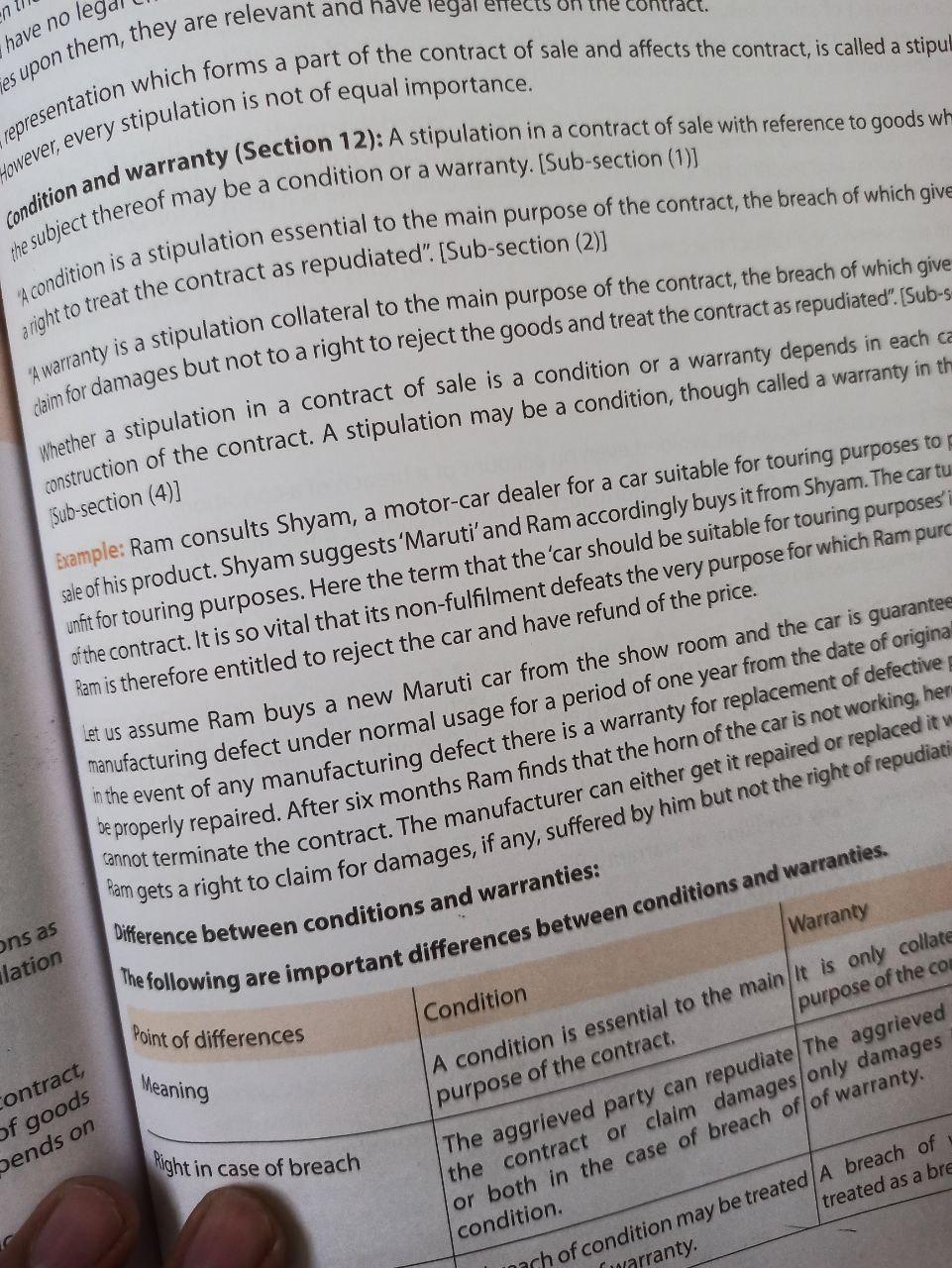

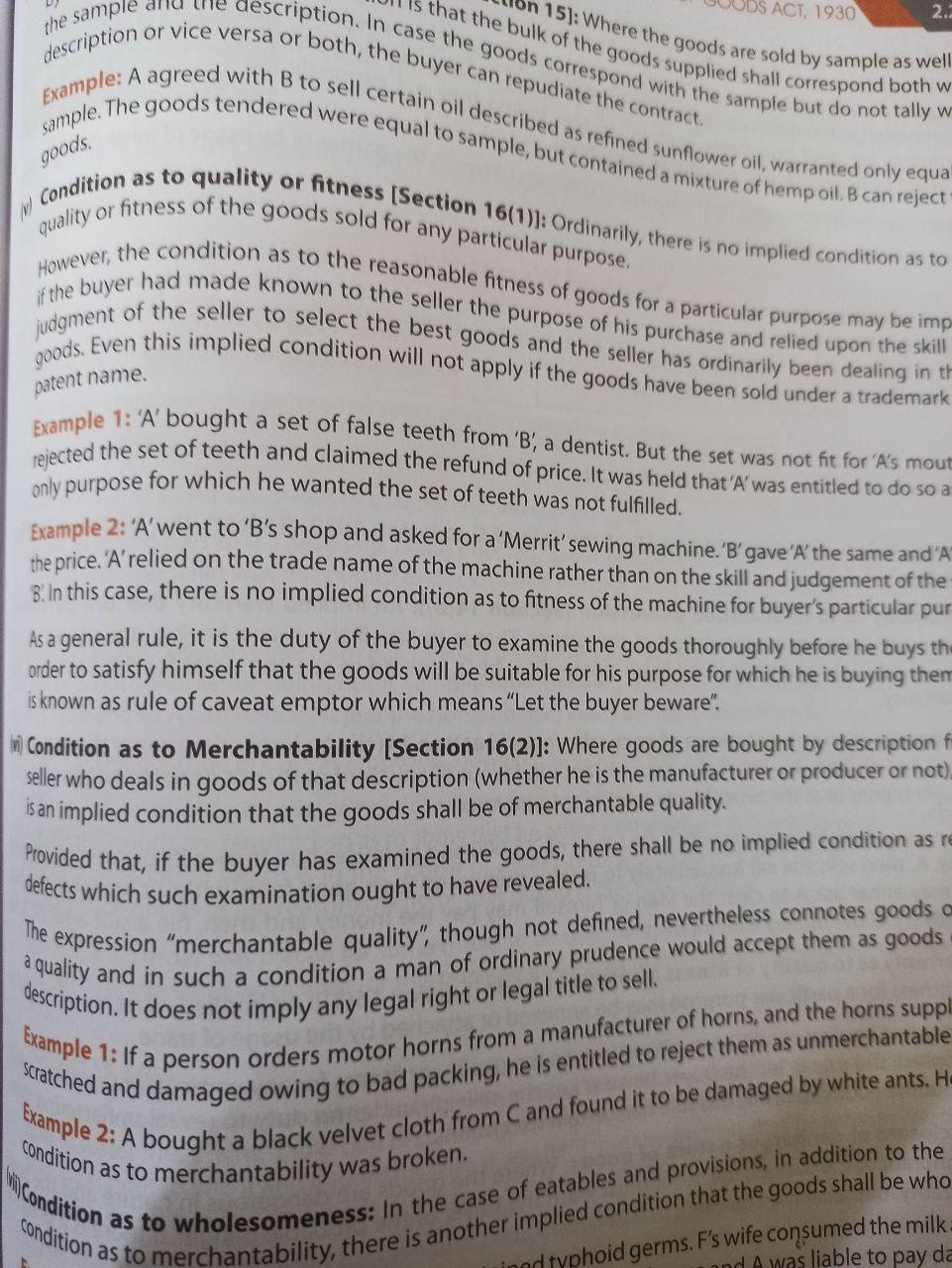
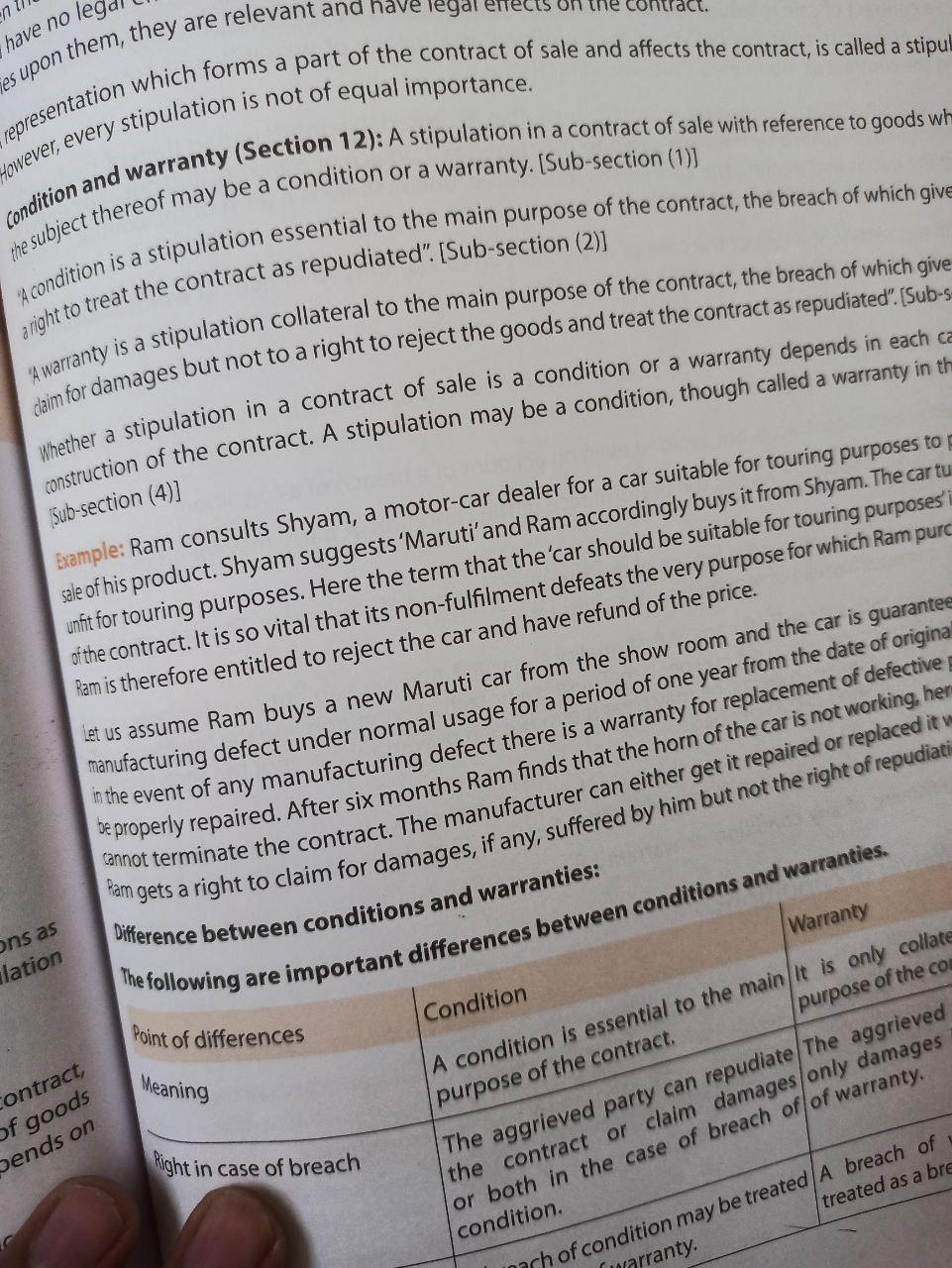

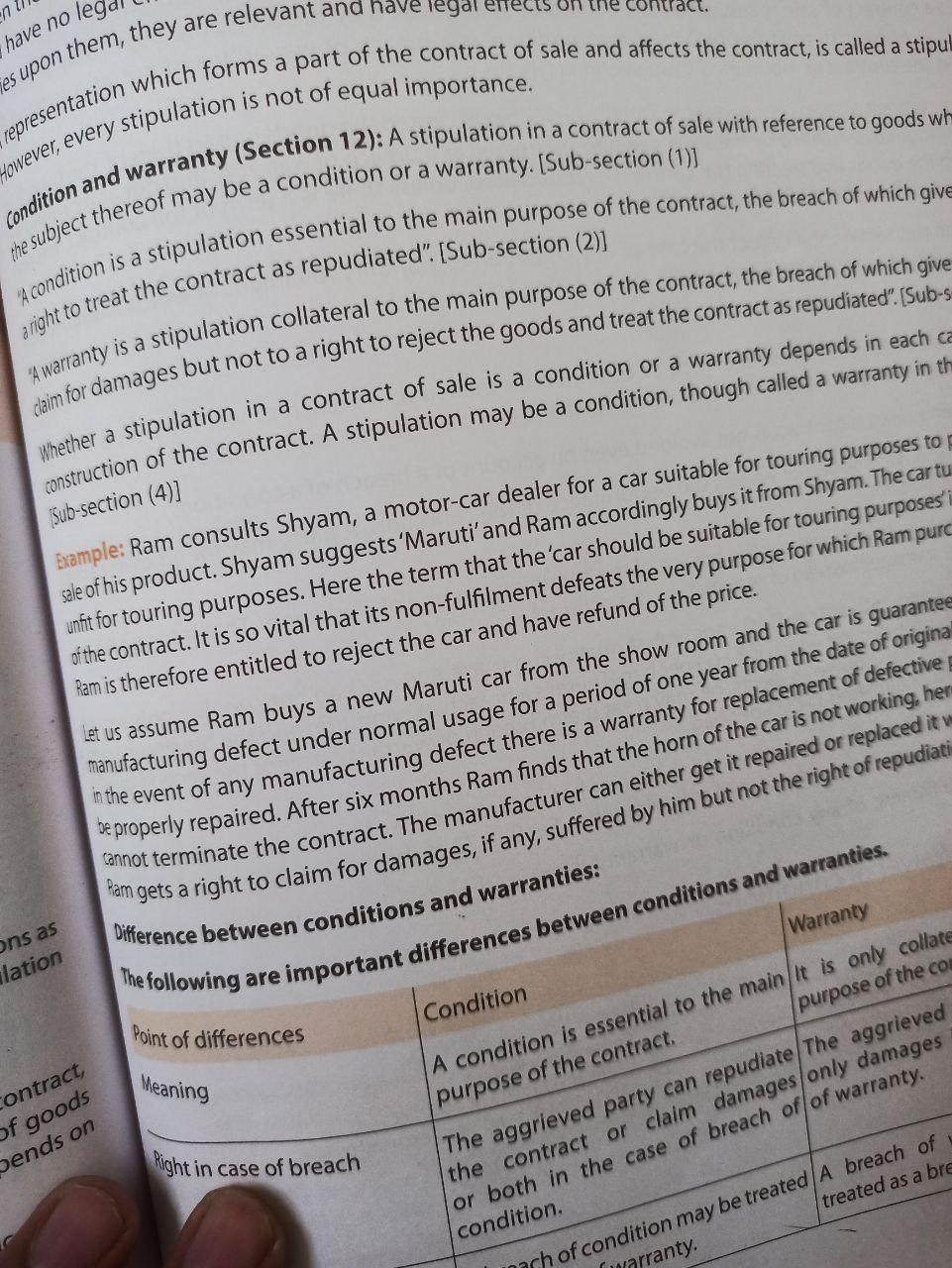
of Time property Position of the party Resale passing Property in the you Burden of Risk of The seller takes the risk of any loss insolvency of the buyer resulting from the insolvency of the Transfer of title the buyer immediately at the t contract. install The position of the buyer is that of the The position of the hirer is that bailee till he pays the last installme Termination of contract The buyer cannot terminate the The hirer may, if he so likes, termi owner of the goods. good contract and is bound to pay the price the contract by returning the its owner without any liability to the remaining installments. of the goods. The owner takes no such risk, for i hirer fails to pay an installment, owner has right to take back the go buyer. eve The buyer can pass a good title to a The hirer cannot pass any title bona fide purchaser from him. Mba bona fide purchaser. The buyer in sale can resell the goods The hire purchaser cannot resell he has paid all the installments. ur (ii) Sale and Bailment: A 'bailment' is the delivery of goods for some specific purpose under a contra the condition that the same goods are to be returned to the bailor or are to be disposed off accom to the directions of the bailor. Provisions related to bailment are regulated by the Indian Contrac 1872. 91602 Return of goods Consideration The difference between bailment and sale may be clearly understood by studying the following Basis of difference Sale Bailment Transfer of property The property in goods is transferred There is only transfer of possessio from the seller to the buyer. goods from the bailor to the baile any of the reasons like safe cust carriage etc. The return of goods in contract of The bailee must return the good sale is not possible. the bailor on the accomplishmen the purpose for which the bailm was made. The consideration is the price in The consideration may be gratuit terms of money. goods or non-gratuitous. (iii) Sale and contract for work and labour: A contract of sale of goods is one in which some sold or are to be sold for a price. But where no goods are sold, and there is only the doing or rende of some work of labour, then the contract is only of work and labour and not of sale of goods. Example: Where gold is supplied to a goldsmith for preparing an ornament or when an artist is as to paint a picture. s that the bulk of the goods supplied shall correspond both w or vice versa or both, the buyer can repudiate the contract. description. In case the goods correspond with the sample but do not tally w 15]: Where the goods are sold by sample as well the sample all description ACT, 1930 2.2 Example: A agreed with B to sell certain oil described as refined sunflower oil, warranted only equa sample. The goods tendered were equal to sample, but contained a mixture of hemp oil. B can reject- goods. (V) Condition as to quality c quality vor fitness of the goods sold for any particular purpose. or fitness [Section 16(1)]: Ordinarily, there is no implied condition as to However, the condition as to the reasonable fitness of goods for a particular purpose may be imp judgment of the seller to select the best goods and the seller has ordinarily been dealing in th if the buyer had made known to the seller the purpose of his purchase and relied upon the skill goods. Even this implied condition will not apply if the goods have been sold under a trademark patent name. Example 1: 'A' bought a set of false teeth from 'B', a dentist. But the set was not fit for 'A's mout rejected the set of teeth and claimed the refund of price. It was held that A was entitled to do so a only purpose for which he wanted the set of teeth was not fulfilled. Example 2: 'A'went to 'B's shop and asked for a 'Merrit' sewing machine. B' gave 'A' the same and A the price. 'A'relied on the trade name of the machine rather than on the skill and judgement of the 8. In this case, there is no implied condition as to fitness of the machine for buyer's particular pur As a general rule, it is the duty of the buyer to examine the goods thoroughly before he buys the order to satisfy himself that the goods will be suitable for his purpose for which he is buying them is known as rule of caveat emptor which means "Let the buyer beware". Condition as to Merchantability [Section 16(2)]: Where goods are bought by description fr seller who deals in goods of that description (whether he is the manufacturer or producer or not). is an implied condition that the goods shall be of merchantable quality. Provided that, if the buyer has examined the goods, there shall be no implied condition as re defects which such examination ought to have revealed. The expression "merchantable quality", though not defined, nevertheless connotes goods a a quality and in such a condition a man of ordinary prudence would accept them as goods description. It does not imply any legal right or legal title to sell. Example 1: If a person orders motor horns from a manufacturer of horns, and the horns suppl Scratched and damaged owing to bad packing, he is entitled to reject them as unmerchantable Example 2: A bought a black velvet cloth from C and found it to be damaged by white ants. H Condition as to merchantability was broken. Condition as to wholesomeness: In the case of eatables and provisions, in addition to the condition as to merchantability, there is another implied condition that the goods shall be who ined typhoid germs. F's wife consumed the milk. and A was liable to pay da d'Warranties' may be either express or implied. They are "express" whe sly state them. They are implied when, not being expressly provided for. -ions are those, which are agreed upon between the parties at the time C ded in the contract. ditions, on the other hand, are those, which are presumed by law to be prese ed that an implied condition may be negated or waived by an express ag ow a different intention. ons: Following conditions are implied in a contract of sale of goods unless t condition as to title sale by sample condition as to quality or fitness Implied condition as o wholesomeness Implied Conditions condition as to description sale by sample as well as by description condition as to merchantability title [Section 14(a)]. In every contract of sale, unless there is an agre implied condition on the part of the seller is that ale, he has a right to sell the goods, and an agreement to sell, he will have right to sell the goods at the time wher e condition implied is that the seller has the right to sell the goods at th defective, the buyer must return ntract of sale may be fixed by the contract or e determined by the course of dealing between the parties. s not determined in accordance with the foregoing provisions, the buyer shall pay e price. What is a reasonable price is a question of fact dependent on the circumstanc case. etary consideration for sale of goods [Section 2 (10)]. By virtue of Section 9, the price may be- act, or in a manner provided by the contract, e.g., by a valuer, or course of dealings between the parties. aluation (Section 10): agreement to sell goods on the terms that the price is to be fixed by the valuation uch third party cannot or does not make such valuation, the agreements is thereby goods or any part thereof have been delivered to, and appropriated by, the buyer mable price therefore. arty is prevented from making the valuation by the fault of the seller or buyer, the ey maintain a suit for damages against the party in default. orice has to be fixed by the third party and he either does not or cannot make such the determination of price by a third party. Where there is an agreement to sell t will be void. In case the third party is prevented by the default of either party party at fault will be liable to the damages to the other party who is not at fault as received and appropriated the goods must pay a reasonable price for them in immediately. Q refuses to fix the price. As such P ask S to return the bike already bikes. He agrees to sell both of the bikes to S at a price to be fixed by the Q. He For the delivery of the second bike too. In the given instance huver S shall pay e bike already taken. As regards the Second bike, thr hilar way Dods, without any fault on the er to answer to their description in agreement before the risk passes to the buyer. I ed on the ground of impossibility of performance as stated above. may, however, be noted that section 7 & 8 apply only to specific goods and not to unascertai pods. If the agreement is to sell a certain quantity of unascertained goods, the perishing of ever hole quantity of such goods in the possession of the seller will not relieve him of his obligatic deliver the goods. Distinction between 'Sale' and 'Hire Purchase' In case of hire purchase, the agreement is that the hirer regularly pays the various installments between the parties. In Sale the payment-may be made cash-down or through installments. 2. The subject matter of the hire, on payment of the last installment, shall become the proper hirer, if such installments are not paid, the article will remain the property of the hire-vendor (s the hire vendor will be entitled to regain possession thereof. In Sale, the property in goods is t to the buyer immediately on signing the contract. 3. A hire purchase agreement is both a bailment and an option to buy. In case of Sale it is not 4. In case of hire purchase the hirer cannot sell the article to a third party. In Sale the purchas This is based on the concept of ownership. 3: Essentials of Contract of Sale The following elements must co-exist so as to constitute a contract of sale of goods ur Goods Act, 1930. re the Examine er the said (1) There must be at least two parties (ii) The subject matter of the contract must necessarily be goods (ii) A price in money (not in kind) should be paid or promised. (iv) A transfer of property in goods from seller to the buyer must take place. (v) A contract of sale must be absolute or conditional [section 4(2)]. (vi) All other essential elements of a valid contract must be present in the contrac E D $ 4 C R LL F 5 V T G 16 A 6 B Y MA OL WW H F7 & 7 N U G J FB * CO 8 e M I F9 K ( 9 D prt sc O


















